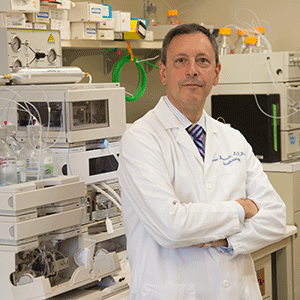Evan D. Kharasch, MD, PhD, and J. Evan Sadler, MD, PhD, have been elected to the Institute of Medicine of the National Academy of Sciences, one of the highest honors medical scientists in the United States can receive.
Kharasch and Sadler, each widely regarded physician-scientists at Washington University School of Medicine in St. Louis, are among 70 new members and 10 foreign associates whose elections to the Institute of Medicine were announced Monday, Oct. 21, by the National Academy of Sciences.
The Institute of Medicine serves as a national resource for independent analysis and recommendations on issues related to medicine, biomedical sciences and health. It was established in 1970 as part of the National Academy of Sciences, which advises the federal government on science and technology issues. Members are selected based on their professional achievements and commitment to service.
As members, Kharasch and Sadler will devote a significant amount of volunteer time on committees engaged in a broad range of health-policy issues.

Robert Boston
Evan D. Kharasch, MD, PhD
Kharasch, the Russell D. and Mary B. Shelden Professor of Anesthesiology and professor of biochemistry and molecular biophysics, is also the vice chancellor for research at Washington University.
In his role as vice chancellor, he is an officer of the university, a member of the University Council and chief officer for the university’s research mission, overseeing an enterprise that generates more than $500 million annually for sponsored research from a wide array of funding sources. The office is integral to the university’s research operations, grants infrastructure and research strategies.
Kharasch leads the university’s initiative on research innovation and entrepreneurship, which aims to maximize public benefit from the university’s fundamental research discoveries. His office also oversees the continuing education of faculty and staff regarding research regulations as well as issues related to conflict of interest, research integrity, intellectual property and technology transfer.
Kharasch, who was awarded the Shelden Professorship in 2007, also has been the director of the Department of Anesthesiology’s Division of Clinical and Translational Research since he arrived at the university in 2005. His research interests include basic, translational and clinical pharmacology, with an emphasis on mechanisms and clinical aspects of drug disposition, interactions, toxicity and pharmacogenetics. His studies are aimed toward a better understanding of individual differences in response to drugs and optimization of therapy.
A Chicago native, Kharasch earned a bachelor’s degree in medical sciences, a doctorate in pharmacology and a medical degree from Northwestern University in Chicago. He then completed an internship, residency and a research fellowship in anesthesiology at the University of Washington in Seattle before joining its faculty in 1988.
Kharasch has received various other honors and awards throughout his career and is one of 23 inaugural members of the Honorary Academy of Mentors for the American Society of Anesthesiologists Foundation for Anesthesia Education and Research.

Robert Boston
J. Evan Sadler, MD, PhD
Sadler is professor of medicine and of biochemistry and molecular biophysics and chief of the Division of Hematology at the School of Medicine.
Sadler’s work focuses on understanding and treating blood clotting and bleeding disorders. His expertise includes devastating conditions such as thrombotic thrombocytopenic purpura. This condition causes tiny blood clots to form in small blood vessels throughout the body and can damage the kidney, brain, heart and other vital organs. He also studies von Willebrand Disease, the most common inherited bleeding disorder in humans.
According to Sadler, the study of rare and sometimes deadly bleeding disorders has led to improved understanding of bleeding and clotting in humans generally, including the causes of more common clots that lead to heart attack and stroke.
Sadler earned a bachelor’s degree from Princeton University in 1973 followed by a doctorate in biochemistry from Duke University in 1978. A year later, he earned a medical degree, also from Duke. After further training and research in hematology at the University of Washington in Seattle, Sadler joined the faculty of Washington University School of Medicine in 1984. He became professor of medicine and of biochemistry and molecular biophysics in 1993 and chief of the Division of Hematology in 2009.
Throughout his career, Sadler’s work has been recognized with honors and awards including Investigator Recognition Awards and a Distinguished Career Award from the International Society on Thrombosis and Haemostasis. He also received the William Dameshek Prize in 1998 from the American Society of Hematology for outstanding contributions to the field.
He is a fellow of the American Heart Association and principal investigator of a $9 million grant from the National Heart Lung and Blood Institute (NHLBI) to support a Translational Research Center in Thrombotic and Hemostatic Disorders.
Washington University School of Medicine’s 2,100 employed and volunteer faculty physicians also are the medical staff of Barnes-Jewish and St. Louis Children’s hospitals. The School of Medicine is one of the leading medical research, teaching and patient care institutions in the nation, currently ranked sixth in the nation by U.S. News & World Report. Through its affiliations with Barnes-Jewish and St. Louis Children’s hospitals, the School of Medicine is linked to BJC HealthCare.

